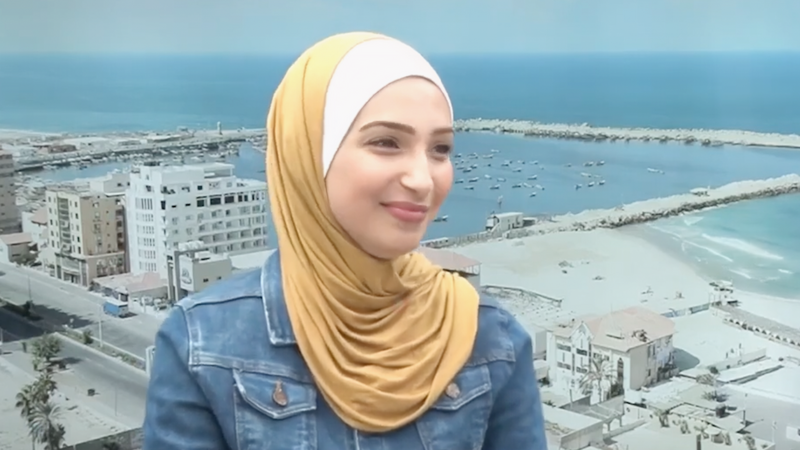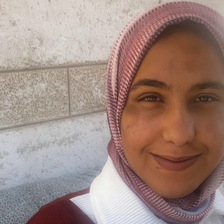The Electronic Intifada 4 September 2025

Haya Murtaja during an interview with Alkofiya TV.
On the afternoon of 18 March, Haya Murtaja was in al-Rimal, the heart of commerce and culture in Gaza City, shopping for knee socks and hair accessories for her two daughters – Sham, 5, and Mariam, 2.
Haya – a 30-year-old Palestinian journalist, singer and voiceover artist – was preparing for Eid al-Fitr, the holiday marking the end of Ramadan.
While Haya was in al-Rimal, an airstrike hit nearby, signaling that Israel had broken the ceasefire reached in January and resumed its military onslaught in the Gaza Strip.
Haya was terrified.
When the intensive Israeli airstrikes escalated at night, Haya’s heart suddenly stopped for about 25 minutes while she was visiting her neighbors in the apartment next door.
Her husband Mohammed – who was out at the time – returned home and took Haya to Al-Shifa Hospital, where doctors applied electric shocks to restart her heart.
Haya was deprived of oxygen to her brain, which caused convulsions and left her in a coma.
The next day, Haya was supposed to have a CT scan at Al Ahli Arab Hospital, but no ambulances with the necessary life support equipment were available to transport her.
Haya remained in a coma for nearly two weeks before she died on 1 April during Eid al-Fitr.
Vivacious
Haya began her media career by imitating the voices of cartoon characters, embodying the demeanor of Disney’s takes on Cinderella and Rapunzel.
“Haya resembled the cartoon characters she imitated in her calmness, modesty and [hand movements and facial expressions],” said Sally Thabet, a journalist for Alkofiya TV and a close friend of Haya.
In 2019, Haya married her childhood friend Mohammed al-Shanat, who said she was deeply attached to their two daughters and documented them in “all their little details” by taking photos and videos.
She captured their milestones, such as “when Sham uttered the words mama and baba for the first time, and when Mariam walked her first steps,” Mohammed told The Electronic Intifada.
When the couple went out without the children, Haya often asked Mohammed if they could return after about an hour because she missed them.
“She wanted them to always be with her,” Mohammed said.
In 2020, Haya launched a YouTube channel where she published her work, including songs, voiceovers and interviews she gave to various media outlets.
Her channel features her renditions of lullabies synced with video of her in the recording studio, as well as her songs produced for educational programming for children.
Mohammed Daher, a photographer she met when they applied for the same job in 2018, helped Haya set up the channel.“I worked voluntarily as a photographer, filming and editing her recorded songs before publishing them,” Daher told The Electronic Intifada.
Haya’s popularity grew, and she was interviewed by outlets such as Palestine TV and Alkofiya TV.
Alongside volunteering as a spokesperson for a charity supporting orphaned children, Haya continued to develop her channel and hoped to begin writing her own song lyrics rather than covering existing songs.
Displacement
When the war erupted in early October 2023, Haya, her husband Mohammed and their two daughters evacuated to the home of Mohammed’s sister in Khan Younis in southern Gaza before moving further south to Rafah – first to the home of an acquaintance and later to a school.
At the beginning of February 2024, when Haya’s parents and siblings evacuated to Deir al-Balah in central Gaza, she joined them there with her daughters and husband.
At the end of April, Haya’s parents and siblings evacuated to Egypt.
“We said goodbye to each other as if it was the last time I would see her,” Haya’s mother, Rania Murtaja, told The Electronic Intifada.
“Haya cried with anguish and pain – I had never seen her like this before,” she added.
Rania and Haya’s father were trying to arrange for the evacuation of their daughter and her family.
“I made passports for her, her husband and her daughters,” Rania said. “We were waiting for her in Cairo.”
But with the complete closure of Rafah crossing after Israel seized it in early May 2024, Haya and her family remained in Gaza.
They moved to a piece of land in Nuseirat refugee camp, where they stayed until early June, when the Israeli army, including soldiers disguised as civilians, carried out a massacre during an operation to free four Israeli captives.
After that, they returned to Deir al-Balah and spent a month in a warehouse – which Haya described as “the grave” because it was dark and poorly ventilated, according to Mohammed – before relocating to a tent camp in eastern Deir al-Balah, where they stayed for six months.
Haya was distressed that her daughters had no choice but to endure life in a tent with stifling heat during the day and bitter cold at night.
Mohammed Daher, Haya’s photographer friend, said that despite the ordeal, Haya was “always optimistic that God would turn these days into better ones.”
After a ceasefire went into effect in late January this year, Haya and her family returned to their apartment on al-Jalaa street in Gaza City.
They began to resume their routine as best as possible: Mohammed, an accountant, went to work in the mornings, Sham attended a privately run kindergarten and Haya stayed home with Mariam.
Haya wanted to provide hospitality to her friends who no longer had a home to return to after the ceasefire.
“She would call me ‘homeless,’ teasing me that I had lost my house in Gaza,” Daher said.
“Haya would call and say, ‘I’m waiting for you and your wife Lina. Talk to my husband and let’s stay up late. We have an empty room – come live with us instead of moving to a tent,’” Daher recounted.
Delicate
When Haya’s heart stopped after Israel resumed its war on Gaza, and she fell into a coma, her husband asked for prayers for her recovery in a Facebook post on 20 March.
Haya’s friends didn’t yet know that she was in a coma.
“When I saw his post praying for her, I thought it was a mere flu,” Daher said.
“I thought she was joking with us, and that she would return with a big smile and in good health because she was a girl full of energy and enthusiasm,” he added. “I wish that crying would bring her back.”
Haya’s mother had called her the day Israel resumed bombing Gaza to check on her and calm her down.
“She told me the nearby bombing felt like Judgment Day,” her mother said of the intensive attacks that killed hundreds. “She was scared, screaming and asking why the war had returned.”
“She was naturally delicate and couldn’t bear it,” journalist Sally Thabet said. “I was shocked to learn she had become a martyr of fear.”
Thabet tried to visit Haya in the hospital, but Haya was in critical condition in the intensive care unit and Thabet was unable to see her friend.
Mohammed said that the six years and eight months that he and Haya spent together “were the most joyful years of my life.”
“She was a wife, a lover and a friend,” Mohammed added. “She was always laughing, and if I had negative energy, I would forget everything as soon as I heard her laugh or saw her.”
“She was my support and strength. She was everything beautiful in my life,” he said.
Mohammed finds bittersweet relief in knowing that Haya is spared the pain experienced by him and all parents of young children in Gaza.
“Haya is lucky that she is not witnessing this famine and the hunger of her daughters,” he said.
Mohammed has not yet explained to Sham and Mariam that their mother has died. They ask about their mother every morning, waiting for her to return home.
Hanin A. Elholy is a researcher, writer and translator based in Gaza.





